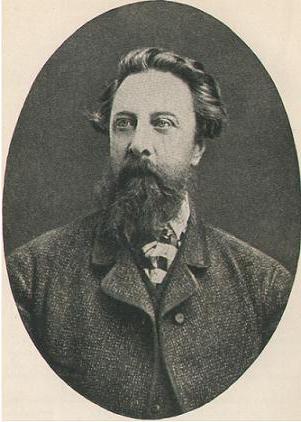Unfortunately, of the three great Tolstoys, only Aleksei Konstantinovich is not studied at school and studied little at universities. He was a man of great mind and great faith. He had no weak works. He wrote only about what he knew.
Writer childhood
He was born on August 24, or September 5, according to a new style, in 1817. In Petersburg. His father was Count Konstantin Petrovich Tolstoy, mother, beauty, Anna Alekseevna. The marriage of his parents was short-lived, when the boy was not even a month old, they divorced. Anna Alekseevna went to her brother in the village of Red Horn. It was there that Tolstoy spent the first eight years of his life. Instead of his father, he was raised by his uncle, Alexei Alekseevich Perovsky, a writer published under the pseudonym Anthony Pogorelsky. So Tolstoy had some genes for writing.
The beginning of the career of Alexei Konstantinovich
The count began to write poetry at the age of six, but for a long time he did not publish them, he considered them ridiculous. The first publication of poetry took place in 1854. They were published in Sovremennik, the journal of Nekrasov. The literary debut took place in 1841. Under the pseudonym, the novel “Ghoul” was published. Already from this work it was clear that the author had chosen his own path and was not going to follow the generally accepted literary canons blindly. In 1867, his first and last lifetime collection of poems was published.
Refusal of a former life
Alexey Konstantinovich was of count origin, and this obliged him to comply with the family title. Of course, his fondness for literature was not approved. Therefore, his writing was perceived as a kind of rebellion, although he was by no means a rebel. “Against the Current,” Tolstoy wrote as an answer to his friends and relatives, those who wanted to see him only as a diplomat. The writer's profession was considered bad form, although the fashion for art in the 19th century was just in its prime.
“Against the Current,” Tolstoy wrote when his name in the literary field already had some weight. That was in 1867. He struggled with himself for a long time and tried to combine service and writing, but realized that this was impossible, and chose what was closer to his heart. At 50, he completely surrendered to literature. Alexey Konstantinovich from the capital left to live in the outback, on his estate, and took up creativity. From all sides he was condemned. A lot of gossip was born. Alexey Tolstoy was against the flow of the general, and this always outrages society. At any time, and even more so in the 19th century.
A brief analysis of Tolstoy’s poem “Against the Current”
In this work, the poet and playwright gives the answer, why he chose a creative path, and not a brilliant career. Moreover, he also urges those like himself to defend their interests and not listen to the opinion of “high society”.
The author says that ruthless modern society does not need creative people at all - dreamers. It is too pragmatic. “Where can you, the revived tribe, resist the tide?” - Tolstoy, as it were, speaks for a condemning and cold majority. But then this refutes, saying that the unknown beckons their strength to herself. By force is probably meant inspiration. After all, this is it - inspiration - helps to see the world more beautiful than everyone else. “Believe the wonderful star of inspiration,” Tolstoy calls in the poem Against the Flow. An analysis of this work also reveals the author’s conviction in his choice, in his rightness, he gives examples of the victory of creativity and believes that art and inspiration will prevail. And only creative work provides immortality.

Alexey Konstantinovich fought for “pure art”. In his poem “Against the Current,” Tolstoy is angry sincerely and convincingly at an injustice to creative people. The position of the author is clear and concise. He made his choice and wanted to support others in the same choice.
A hostile attitude towards the writer has developed not only on the part of society, but also on the part of literary criticism. He felt driven. And appealed to his like-minded people.
The poem reveals the inner world of Alexei Konstantinovich as a hymn of beauty. He considers himself primarily a creator. And glorifies literature as creativity, this is the main theme of the poem. His idea is that you need to follow your vocation and talent against all odds.
The size by which the poem is written is dactyl. Epithets and metaphors are abundantly used, as well as personification - “the world has sobered up”.
Tolstoy idealizes the tasks of art, for him they come from God. Creativity is a shrine: “Let us come out solemnly with our holiness!”